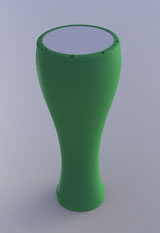 Industrial Design students Maxwell Morein ’12 and Riley Erickson ’11 took top honors in the Association of Rotational Molders’ (ARM) International Student Design Competition with their eco-friendly, inventive projects.
Industrial Design students Maxwell Morein ’12 and Riley Erickson ’11 took top honors in the Association of Rotational Molders’ (ARM) International Student Design Competition with their eco-friendly, inventive projects.
In an interview after receiving his award, Morein said he saw the competition as a chance to design a user-friendly product with widespread appeal.
"My entry is a Djembe, a hand-held percussive drum that traditionally costs about $500. It’s typically very expensive, but the rotational molding process significantly reduces the cost."
And that makes the instrument accessible to a broader range of people, including school music programs, said Morein. The materials are inexpensive, the use of colored plastic in the molding process reduces the finishing cost (and thus environmental impact) and the design possibilities are endless.
 Erickson also focused on affordability by designing “Northern Escape,” an ice fishing house that is cost-effective and ecological. The hollow structure leaves room for foam insulation and allows the house to float, in case of thin ice.
Erickson also focused on affordability by designing “Northern Escape,” an ice fishing house that is cost-effective and ecological. The hollow structure leaves room for foam insulation and allows the house to float, in case of thin ice.
"Some mobile fishing houses on the market retain the ability to float on water," said Erickson, "but they are priced out of range for the average consumer. However, most fishing houses do not float, and their size and weight can lead to dangerous conditions if put on thin ice."
"With hefty penalties in place by local officials, losing a house and fishing gear to the bottom of the lake can be a costly ordeal," he said.
The product of a semester’s work, these sustainable, cost-effective designs gained attention from the international design community when they were recognized at the Association of Rotational Molders’ annual meeting in Montreal, Quebec. The students received their awards in early October.
"It’s a proud moment, to know that hundreds of people from all over the world have seen and appreciate our designs," said Morein.
Hear the Industrial Design students on Lake Effect







